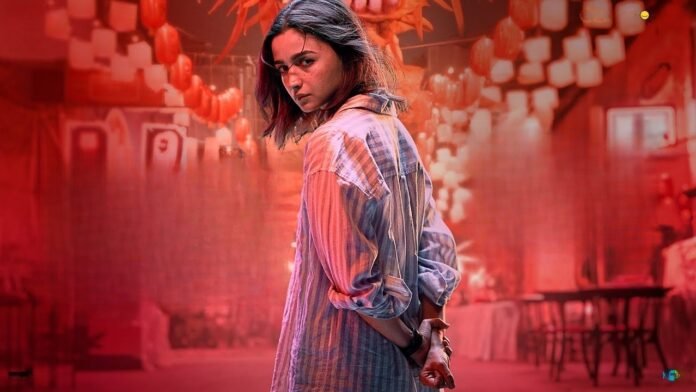Vasan Bala’s “Jigra” emerges as one of the standout Hindi films of the year, showcasing an impressive synergy between the director’s irreverent style and Karan Johar’s signature dramatic flair. Starring the talented Alia Bhatt, the film strikes a balance between playful nods to cinema and deeply engaging storytelling, making it a must-watch for audiences.
Bala knows how to create a villain that viewers love to hate. He understands the cynicism of modern audiences, who often search for a figure to project their frustrations onto. However, the true challenge lies in making the audience empathize with the protagonist. “Jigra” succeeds in this area, allowing viewers to connect emotionally with its characters. This connection requires the audience to lower their defenses and embrace vulnerability. In a cinematic landscape often filled with superficial narratives, Bala crafts a story that invites viewers to engage with its characters on a deeper level.
Alia Bhatt, in the lead role, shines brilliantly. She embodies her character’s complexities, moving seamlessly from moments of strength to vulnerability. Her performance anchors the film, and her ability to convey genuine emotion allows the audience to invest fully in her journey. The film unfolds in a way that encourages viewers to care about her struggles and triumphs, making her a relatable figure in a world that often feels chaotic.
The film employs Bala’s trademark irreverent humor while maintaining a sense of earnestness that resonates throughout the narrative. Even as he weaves in cinematic references and playful cameos, Bala never loses sight of the emotional core of his story. This blend of humor and sincerity creates a captivating viewing experience, where every scene feels purposeful and engaging.
“Jigra” also plays with cinematic tropes and familiar references, using them as a way to enhance its narrative rather than distract from it. At one point, characters drop names of acclaimed filmmakers like Wong Kar-wai and Kim Ki-duk, creating an atmosphere that celebrates the art of cinema while simultaneously grounding the story in relatable experiences. Such references enrich the film, adding layers to its already complex narrative.
The opening sequence, set to the nostalgic tune of “Kuch Kuch Hota Hai,” cleverly juxtaposes classic Bollywood with contemporary themes, inviting viewers into a world that feels both familiar and fresh. This approach not only highlights Bala’s understanding of cinema but also sets the stage for a film that balances nostalgia with modern storytelling.
Bala’s ability to craft an emotionally resonant narrative is what ultimately elevates “Jigra” from being just another film to a significant contribution to Hindi cinema. His exploration of themes like love, loss, and redemption unfolds in a way that feels both genuine and thought-provoking. The story invites viewers to reflect on their own lives, creating a shared experience that lingers long after the credits roll.
Karan Johar’s involvement in “Jigra” adds another layer of intrigue. His trademark style complements Bala’s unique vision, resulting in a film that feels like a celebration of both filmmakers’ strengths. As the film concludes, one can’t help but hope that Johar continues to support Bala’s artistic endeavors, allowing him the freedom to explore and create without constraints.
Vasan Bala’s “Jigra” also distinguishes itself with its visual storytelling, creating an atmosphere that mirrors the emotional landscape of the characters. The cinematography captures both the beauty and grit of the setting, enhancing the narrative’s impact. From sweeping shots of the vibrant locales to intimate close-ups that reveal the characters’ innermost thoughts, every frame feels meticulously crafted. This attention to detail elevates the film, allowing the audience to become fully immersed in the world Bala has created.
The film’s supporting cast also deserves recognition for their contributions. Each character adds depth to the story, providing various perspectives that enrich the protagonist’s journey. The dynamics between characters are palpable, showcasing the complexities of human relationships. Whether it’s a friend, family member, or a fleeting encounter, each interaction contributes to the film’s exploration of love and connection.
The music in “Jigra” further complements its emotional tone, with a soundtrack that resonates with the film’s themes. The songs blend seamlessly into the narrative, enhancing pivotal moments and adding layers to the storytelling. Bala carefully selects musical cues that evoke feelings of nostalgia, longing, and joy, inviting the audience to connect with the characters on a sensory level.
Moreover, “Jigra” addresses significant social issues subtly woven into the narrative. Bala’s storytelling does not shy away from the complexities of modern life, touching upon themes such as mental health, societal expectations, and the struggle for self-identity. These elements resonate deeply, making the film relatable to a wide audience. By weaving these themes into the fabric of the story, Bala encourages viewers to reflect on their own experiences and the challenges they face.
As “Jigra” progresses, the audience witnesses a transformative journey, not just for the characters but also for themselves. The film invites viewers to engage with their own vulnerabilities, challenging them to confront their emotions openly. This invitation to connect on a deeper level is a testament to Bala’s skill as a filmmaker, as he creates a space where viewers feel safe to explore their own feelings.
In the end, “Jigra” serves as a reminder of the power of cinema to evoke empathy and connection. As audiences continue to flock to theaters, Bala’s film stands as a beacon of hope in a landscape often filled with formulaic narratives. With its compelling characters, engaging storytelling, and beautiful visuals, “Jigra” not only entertains but also leaves a lasting impact. It urges viewers to celebrate their own stories while recognizing the shared experiences that unite us all.
In a world that sometimes feels increasingly disconnected, “Jigra” becomes a celebration of human emotion, resilience, and the importance of storytelling. As viewers reflect on the film, they may find themselves inspired to embrace their own narratives, share their vulnerabilities, and connect with others on a deeper level. Bala’s creation is not merely a film but an invitation to experience the richness of life, love, and the connections that bind us together.

